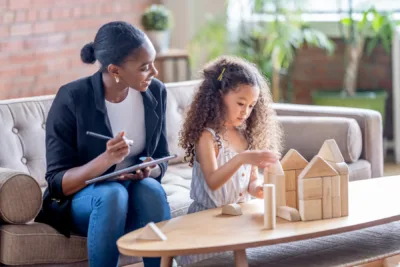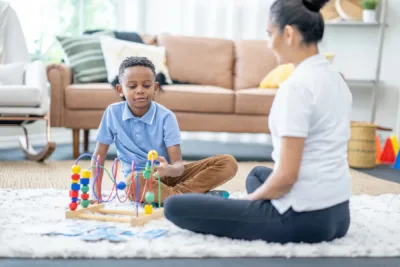Raising a child can be one of life’s greatest joys, but it also comes with its share of worries. If you’ve noticed your child struggling emotionally, socially, or behaviorally, you’re likely exploring every avenue to help them thrive. You might be wondering if play therapy, a specialized approach gaining traction, could be the answer.

A recent study by the CDC found that 1 in 6 children aged 6-17 in the United States had a mental, behavioral, or developmental disorder in 2017-2019. Understanding effective therapeutic options is more important than ever. At Sunstone Counseling, we help children learn all types of skills through play therapy. Here are some of our insights into the world of play therapy, exploring its effectiveness, benefits, and what you can realistically expect for your child.
Play Therapy: More Than Just Games, It's Powerful Healing
Play therapy is a structured, evidence-based approach where trained therapists utilize play to help children communicate and process their emotions. It recognizes that for children, play is not just fun – it's their natural language and how they make sense of the world.
 What Exactly IS Play Therapy?
What Exactly IS Play Therapy?
Play therapy is a therapeutic approach specifically designed for children, typically aged 3 to 12. Unlike adults, who can often express themselves verbally, children often communicate their feelings and experiences through play. In a play therapy session, a child will engage in play within a safe and supportive environment, using toys, games, art supplies, and other mediums. The therapist observes and interacts with the child, interpreting their play to understand their inner world and help them address emotional, social, or behavioral challenges.
How Does Play Therapy Actually Work?
Play therapy operates on several key principles. First, it provides a safe and consistent space for children to express themselves without judgment. The therapist builds a trusting relationship with the child, fostering a sense of security that allows them to explore difficult emotions and experiences. Through play, children can externalize their problems, acting them out with toys rather than keeping them bottled up inside. The therapist then helps the child make sense of these play themes, guiding them toward healthier coping mechanisms and problem-solving skills. Essentially, the therapist enters the child's world of play to facilitate healing and growth from within.
Who Benefits Most from Play Therapy?
Play therapy can be beneficial for a wide range of children experiencing various challenges. It is often highly effective for children who are:
- Experiencing anxiety or fear: Play can help children process anxieties related to separation, school, social situations, or general worries.
- Dealing with grief or loss: Play provides a non-threatening way to express and work through feelings of sadness, confusion, and anger related to loss.
- Struggling with behavioral issues: Play therapy can help children understand and manage disruptive behaviors, aggression, or defiance by exploring the underlying emotions driving these behaviors.
- Navigating trauma: Play therapy offers a gentle and empowering approach for children who have experienced trauma, allowing them to process difficult memories and develop coping strategies at their own pace.
- Having difficulty with social skills: Play therapy can improve social interaction, communication, and cooperation skills through role-playing and guided play scenarios.
- Adjusting to life changes: Major life transitions like divorce, moving, or the arrival of a new sibling can be stressful for children. Play therapy can help them adapt to these changes.
What Results Can Parents Realistically Expect from Play Therapy?
 While every child's journey is unique, parents can generally expect to see positive changes in their child through play therapy. These may include:
While every child's journey is unique, parents can generally expect to see positive changes in their child through play therapy. These may include:
- Improved emotional regulation: Children often become better at identifying, expressing, and managing their emotions in healthy ways.
- Reduced behavioral problems: As children learn to understand and address the root of their behaviors, disruptive actions often decrease.
- Enhanced communication skills: Play therapy can help children develop both verbal and non-verbal communication skills, leading to clearer expression of their needs and feelings.
- Increased self-confidence and self-esteem: As children successfully navigate challenges in therapy, their sense of competence and self-worth often grows.
- Stronger relationships: By improving emotional and social skills, children often experience healthier and more fulfilling relationships with family and peers.
- Greater resilience: Play therapy equips children with coping mechanisms and problem-solving skills that contribute to greater resilience when facing future challenges.
It's important to remember that therapy is a process, and progress may not always be linear. Open communication with your child's therapist is key to understanding their individual journey and celebrating milestones along the way.
If you are seeking insight into what your child may be going through, you should talk to a child therapist about their developmental progress and whether additional or alternative support might be beneficial. A comprehensive assessment and ongoing evaluation will ensure your child receives the most effective and appropriate care.
Frequently Asked Questions About Play Therapy
At what age can my child start play therapy?
Play therapy is generally most effective for children ages 3 through 12. However, younger and older children can sometimes benefit as well, depending on their developmental level and specific needs.
 How long does play therapy typically last?
How long does play therapy typically last?
The duration of play therapy varies depending on the child's individual needs and the complexity of the issues being addressed. It can range from several months to a year or longer. Your therapist will discuss an estimated treatment plan with you after the initial assessment.
What do parents do during play therapy? Do I attend sessions with my child?
Typically, play therapy sessions are conducted individually between the child and the therapist to create a safe and confidential space for the child. However, parent involvement is crucial! Therapists will regularly communicate with parents through parent sessions, providing updates on progress and offering strategies for supporting their child at home. In some cases, parent-child sessions or family therapy sessions might also be incorporated.
Is play therapy covered by insurance?
Many insurance plans do reimburse for play therapy when provided by a mental health professional. It's always best to verify your specific coverage with your insurance provider and discuss payment options with Sunstone Counseling.
How do I know if play therapy is working for my child?
Signs that play therapy is effective can include improvements in your child's mood, behavior, social interactions, emotional expression, and overall well-being. You may notice your child seeming happier, calmer, more communicative, and better able to cope with challenges. Regular communication with your child's therapist will also provide insights into their progress.
How to Start Play Therapy for Your Child
Play therapy offers a powerful and developmentally appropriate path to healing and growth for many children. If you are concerned about your child's emotional well-being or believe they could benefit from a supportive therapeutic environment, we encourage you to reach out to a therapist specializing in play therapy at Sunstone Counseling.
Our team of experienced play therapists is dedicated to helping children unlock their full potential and build brighter futures. Book an appointment to get started today.




